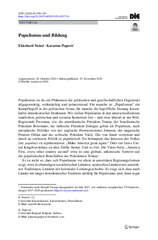Приказ основних података о документу
Populismus und Bildung
| dc.creator | Nuissl, Ekkehard | |
| dc.creator | Popović, Katarina | |
| dc.date.accessioned | 2024-03-01T11:43:57Z | |
| dc.date.available | 2024-03-01T11:43:57Z | |
| dc.date.issued | 2020 | |
| dc.identifier.issn | 2364-0022 | |
| dc.identifier.uri | http://reff.f.bg.ac.rs/handle/123456789/6259 | |
| dc.description.abstract | The editorial discusses the pervasive and polarizing nature of populism in contemporary political and social landscapes. Populist movements are observed worldwide, from leaders like Trump, Bolsonaro, and Erdogan to European figures like Johnson, Orbán, and Vučić. The populist agenda claims to represent the interests of the people, often simplifying complex issues and targeting various groups, particularly migrants. Populism thrives on emotional appeals, simplification of complex issues, and moralization, often polarizing society and undermining trust in established institutions. The article delves into the dimensions of populism, including its emotional, moral, and media-driven aspects, highlighting its ability to mobilize people, exploit societal tensions, and reshape political discourse. Moreover, it discusses the challenges of defining and addressing populism within the framework of representative democracy. | sr |
| dc.language.iso | de | sr |
| dc.publisher | Deutsches Institut für Erwachsenenbildung – Leibniz-Zentrum für Lebenslanges Lernen | sr |
| dc.rights | openAccess | sr |
| dc.rights.uri | https://creativecommons.org/licenses/by/4.0/ | |
| dc.source | Zeitschrift für Weiterbildungsforschung | sr |
| dc.subject | populis | sr |
| dc.subject | adult education | sr |
| dc.subject | political education | sr |
| dc.subject | civic education | sr |
| dc.subject | politics and education | sr |
| dc.title | Populismus und Bildung | sr |
| dc.type | article | sr |
| dc.rights.license | BY | sr |
| dc.citation.epage | 355 | |
| dc.citation.spage | 339 | |
| dc.citation.volume | 43 | |
| dc.identifier.doi | 10.1007/s40955-020-00173-0 | |
| dc.identifier.fulltext | http://reff.f.bg.ac.rs/bitstream/id/15751/bitstream_15751.pdf | |
| dc.type.version | publishedVersion | sr |

